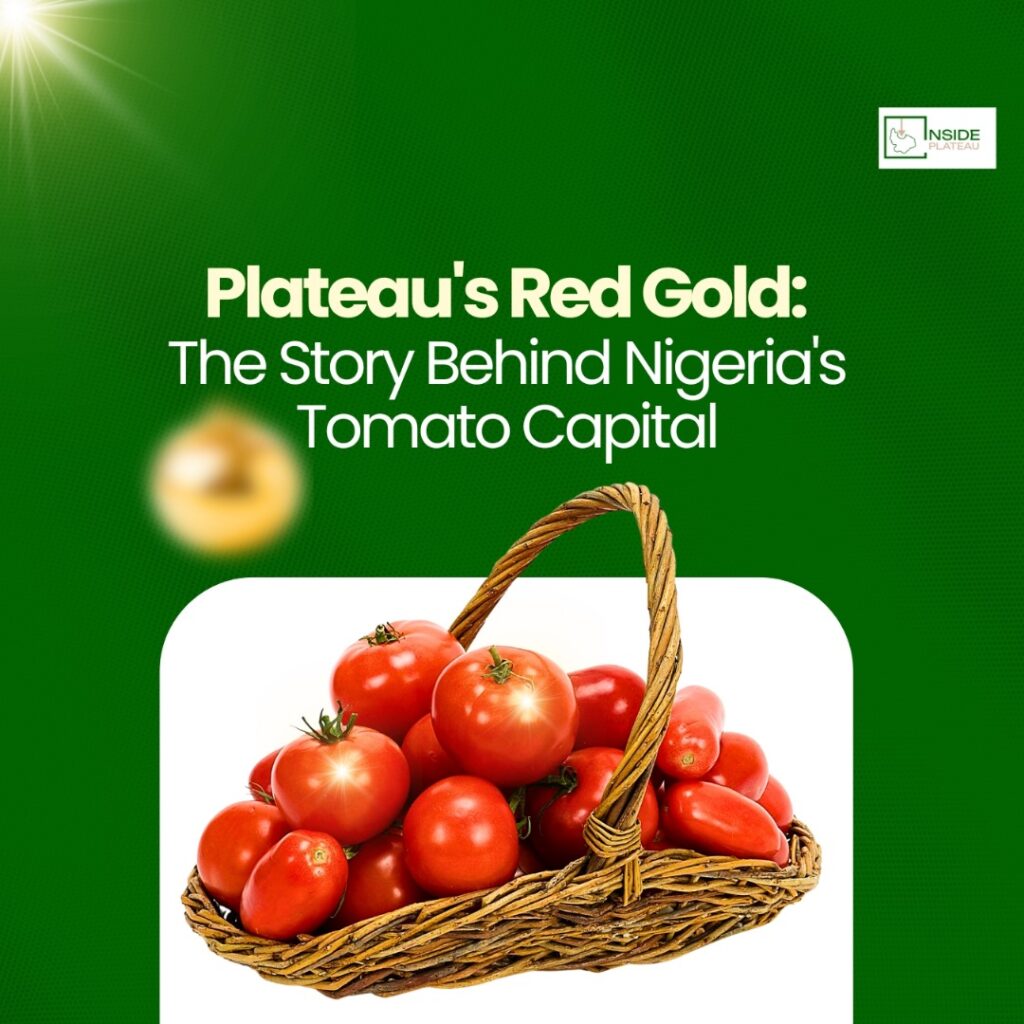Imagine biting a big, round, fresh, and fleshy tomato, with its juice dripping down your throat as you chew, and Its redness leaves marks on your teeth and lips like you just used a lipstick. Amazing , isn’t it? That’s the wonder of Plateau State tomatoes. They are indeed Nigeria’s “red gold.”
If you have bought fresh and tasty tomatoes in Lagos, Port Harcourt, Warrri, Maiduguri, or other parts of the Country, they most likely came from the cold hills of Plateau State. This state is known as the “Home of Peace and Tourism.” But it is more than just that. It is truly Nigeria’s headquarters for growing tomatoes. Tomatoes that are used in kitchens all over the country.
This is not just mere talk. Our tomatoes are perfect due to our good land, hard work, and conducive weather perfect for the plant. Plateau State does not just plant tomatoes. We grow it in perfection.
The title “Tomato Capital of Nigeria” isn’t just about our large harvests; but also built on the superior quality, deep history, and a farming method that ensures tomatoes are grown all year round. The tomatoes grown here are unique—big, bold, and of course juicy. This has created a legacy, a culture, and a huge market that ensures we are able to supply the whole nation. This article tells the true story of how Plateau State rightfully earned its crown as the capital of this “Red Gold.”
The Plateau Advantage: Cool Weather, Rich Soil and Highland
The first and most important reason why Plateau State produces such wonderful tomatoes is simple geography. Plateau State got its name from the Jos Plateau, the highest region and centre of the country.
While most parts of Nigeria are relatively hot, the Plateau is sitting high up, and this gives it a cool and unique climate. This cool, fresh air is truly a game changer for the tomato plant. It allows the plant to grow slowly but far stronger than those cultivated in the lowlands which are mostly hot. This gives the fruits enough time to develop the rich, red colour, grow larger in size, and to fully concentrate their sweetness. The soil in Plateau State is also naturally rich, serving as a perfect nursery that ensures every tomato we produce is of high quality.
The Power of Irrigation
A key aspect of tomato farming in Plateau is that our farmers rely heavily on irrigation. Unlike many places where farmers wait for the rain, here, a large part of the production, especially the high-quality, large harvest, is achieved using irrigation farming.
Farmers use wells, boreholes, rivers, and the water impounded from old mining ponds to irrigate their crops in dry seasons. This steady water supply along with the cool weather, permits Plateau State farmers to plant and harvest tomatoes when other states can’t. That’s a smart move because, dry-season production guarantees a continuous supply of fresh tomatoes, which is crucial in ensuring the state’s Tomatoes Capital status is true.
Where the Magic Happens
Where the Magic Happens
The tomato production is spread across several local government areas in Plateau State. And though Jos is the market hub, the tomatoes are mostly produced at the fertile fields in:
Pankshin
Mangu
Bassa
Barkin Ladi
Jos South and Jos North
These Local Government Areas are the real engines of this golden plant. The farmers in these places constantly overcome challenges to ensure that the nation’s favourite ingredient reaches every nook and cranny.
The Legend of ‘Tomato Jos’
To truly understand how important Plateau’s tomatoes are, you don’t need to only look at the beautiful farm reports; you also need to listen to the people. Across the country, especially in the South-East and South-Western regions, there is one popular phrase commonly used as the perfect compliment for a beautiful, fresh, and attractive young woman: “Tomato Jos.”
This term is not just random; but a direct, living tribute to the very high-quality tomatoes produced in Jos, Plateau State.
Over the years, it has been a custom that when traders and customers in big cities like Lagos, Port Harcourt, Onitsha, or Ibadan seek for the best, freshest, and largest tomatoes, they simply ask for the ones from Jos.
The Plateau Tomato represents perfection: it is big, blameless, and of course perfectly red. When an Igbo brother lovingly calls a lady “Tomato Jos,” it’s his simple but powerful way of saying she is fresh, glowing, and beautiful.
This beautiful name is the strongest evidence that the Plateau tomatoes have become a national treasure. Their beauty, freshness, and high quality are clearly recognised and celebrated by people from all parts of Nigeria.
The Red Gold a Treasure in Every Nigerian Kitchen
The journey of the Plateau tomato is massive and it’s a treasure in every Nigerian kitchen. The tomato supply from the Plateau is very essential, because it acts as the treasure for our national cuisine.
From the farms and markets in Pankshin and Mangu, thousands of baskets, are carefully loaded into trucks. These trucks serve as the mobile markets, because they travel hundreds of kilometres through highways and markets to reach the high-demand cities.
For consumers far away in the Southern and Western markets, the Plateau tomato is popular for its high durability. Buyers understand that a Jos tomato is tough enough to survive the long, dusty travel because of its superior texture and density which is clear evidence of its quality.
Whenever there is a huge Tomatoes harvest in Plateau State, prices drop everywhere, offering a huge relief to families who greatly depend on tomatoes for their daily meals, from jollof rice to stews. This sudden abundance, even with the challenges faced by the farmers, shows how much Plateau State can produce and how important that is to the country’s food security.
Securing the Future of Red Gold
While the fame of the Plateau tomato is very much certain, the production and business faces tough struggles. The Plateau Tomatoes are worth a lot of money, but farmers are constantly challenged by several problems like poor roads, and the high cost of inputs.
The biggest challenge however, is post-harvest loss. Due to lack of good storage and processing facilities, about half of the harvested tomatoes can rot even before they reach the consumer. This is a painful waste of resources and effort.
This is why the next chapter of Agriculture in Plateau is heading towards industrialization. Companies are now beginning to set up processing plants near the farmlands, to enable them process the excess fresh tomatoes into paste and puree. This is a very bold and important step because it stops waste by processing the surplus, meaning less food is lost.
Processing Tomatoes also Stabilises income because farmers would be guaranteed a fair price for their crops, even during a bumper harvest.
Finally, by processing this ‘Red Gold’ locally, Plateau State can transform from being just a supplier of fresh produce into a complete agricultural powerhouse. This would guarantee that Plateau’s delicious tomatoes, the original “Tomato Jos,” is available to consumers in every form, all year round. The Plateau State’s story is a testament to the power of having perfect soil, with cool weather, and the hard work of its farmers.

